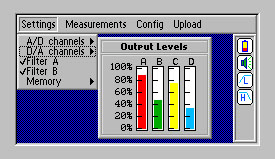HX8369 TFT display driver library
The HX8369 and HX8369-A display controllers are supported by the RAMTEX S6D0129 display driver library package.
Full GUI display driver C source code. Processor and C compiler independent.
More info about Graphic RGB Color library (S6D0129 family)
HX8369 display controller characteristics
Below is a brief introduction to the main characteristics for the HX8369 RGB display controller (seen from a software driver design viewpoint).
For information about the HX8369 driver software support please go to the library description.
HX8369 device type
- COG RGB color display controller for use in small embedded systems with on-chip frame buffer and TFT screen driver.
- The HX8369 supports TFT screens with a size up to 480 x 864 pixels (WxH)
- On-chip TFT driver with voltage generator
Frame buffer
- RGB pixel resolution (bits per pixel): 16-bit, 18-bit, 24-bit.
- HX8369 frame buffer organization: 480 RGB pixels on scan line, 864 lines.
Processor interfaces on HX8369
HX8369 parallel bus interface
- Parallel bus types: 8080 bus type
- Parallel bus size: 8-bit, 16-bit, 18-bit, 24-bit.
- Addressing concept: Indexed bus interface (1 chip select pin + 1 address bit pin (Data/Command))
Serial bus interfaces on HX8369
- SPI bus: 4-wire: /CS, DC, SDIN, SCLK.
- SPI bus: 3-wire: /CS, SDIN, SCLK. SPI-3 uses either a 9 bit byte frame where first bit is DC, or a 8 bit frame where the first byte contains the DC flag
- The bus interfaces are all supported by the HX8369 display driver software package.
Special HX8369 hardware features:
- Special bus support: DSI transmitter receiver interface, MDDI Interface (Mobile Display Digital Interface).
- 0-180, 90-270 degree frame buffer rotation with hardware support. Portrait mode, landscape mode.
- Full driver software support.
Display controller vendor
- Himax Technologies Inc. https://www.himax.com/tw
